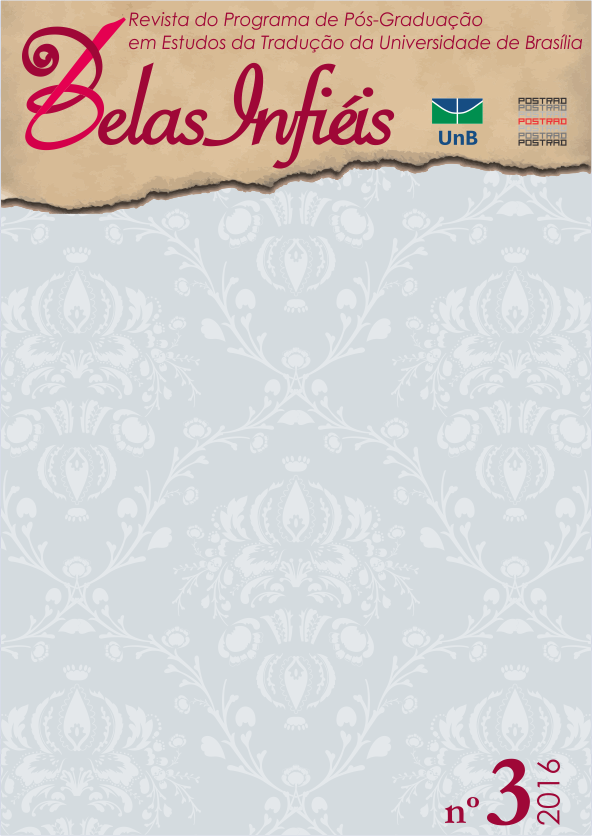AS BELLES INFIDÈLES E OS ROMÂNTICOS ALEMÃES
DOI:
https://doi.org/10.26512/belasinfieis.v5.n3.2016.11401Keywords:
História da tradução, Belles Infidèles, DeutschheitAbstract
O presente artigo relaciona a ascensão da tradição de tradução de cunho prático e filosófico conhecida como Belles Infidèles, que se estabeleceu na França do século XVII, ao contexto que a possibilitou, ressaltando que sua valorização ocorreu em virtude da necessidade que os franceses sentiam de preservar sua língua e cultura ”“ de certa forma, já estabelecidas e dominantes ”“, bem como explica por que tal tradição não prosperou entre os tradutores nos estados germânicos.
Downloads
References
BACHLEITNER, N. A Proposal to Include Book History in Translation Studies Illustrated with German Translations of Scott and Flaubert. In: BITI, V. e LISKA, V. (Org.). Arcadia - International Journal of Literary Culture - Internationale Zeitschrift für Literaturwissenschaft. Disponível em: <http://www.degruyter.com/view/j/arca>. Acesso em: 15/03/2015.
BALLIU, C. Los traductores transparentes: historia de la traducción en Francia durante el período clásico. In: Revista Hyeronymus Complutensis, n. 1, 1995. Disponível em: <http://cvc.cervantes.es/lengua/hieronymus/pdf/01/01_009.pdf >. Acesso em: 10/03/2015.
BERMAN, A. The experience of the foreign: Culture and translation in romantic Germany. Nova Iorque: SUNY, 1992.
BRESSER-PEREIRA, L. C. Nação, estado e estado-nação. Disponível em: <http://www.bresserpereira.org.br/papers/2008/08.21.Na%C3%A7%C3%A3o.Estado.Estado-Na%C3%A7%C3%A3o-Mar%C3%A7o18.pdf>. Acesso em: 01/09/2013.
DELISLE, J. e WOODSWORTH, J. Translators through history. Amsterdam: Jonh Benjamins Publishing Co, 1995.
ENGELS, F. 1888. Die Rolle der Gewalt in der Geschichte. Disponível em: <http://www.mlwerke.de/me/me21/me21_405.htm>. Acesso em: 30/09/2013.
GOETHE, J. W. Tagebuch 15. Januar 1827: An Schuchardt diktiert bezüglich auf französische und Weltliteratur. In: _____. Goethe die letzten Jahre. Vol. II ”“ vom 1. Januar 1823 bis zu seinem Tod. Bibliothek Deutscher Klassiker. Frankfurt am Main: Deutscher Klassiker Vergag, 1993.
HOBSBAWM, E. J. Nações e nacionalismo desde 1780. Tradução de Maris. Celia Paoli e Anna Maria Quirino. Rio de Janeiro: Paz e Terra, 1990.
LUTERO, M. “Sendbrief vom Dolmetschen (1530)”. In FURLAN, Mauri (org. e trad.). Clássicos da teoria da tradução, Renascimento. Vol. 4. Florianópolis: UFSC/NUPLITT, 2006. p. 91-115.
MILTON, J. Tradução ”“ teoria e prática. São Paulo: Martins Fontes, 1998.
NECKER, M. (editor). Maximen und Reflexionen von Goethe. Weimar: Verlag der Goethe Gesellschaft, 1907.
POPPI, C. Século XVII na França: Les Belles Infidèles, Racine e o modelo dos clássicos antigos. In: Non Plus, [S.l.], n. 3, 2013, p. 29-43. Disponível em: <http://www.revistas.usp.br/nonplus/article/view/49033>. Acesso em: 03/03/2015. doi: http://dx.doi.org/10.11606/issn.2316-3976.v2i3p29-43.
SCHLEIRMACHER, F. Über die verschiedenen Methoden des Übersetzens/Sobre os diferentes Métodos de Traduzir (trad. Margarete von Mühlen Poll, Celso R. Braida, Mauri Furlan). In: Revista Princípios, Vol. 14, Nº 21, 2007, p. 233-265.
ZUBER, R. Les « Belles Infidèles » et la formation du goût classique : Perrot d’Ablancourt et Guez de Balzac. Paris : Armand Colin, 1995.
Downloads
Published
How to Cite
Issue
Section
License
Given the public access to this journal, the texts are free to use but requires the recognition of the original authorship and initial publication in this journal to be properly stated.
 The journal allows the use of works published for non-commercial purposes, including the right to submit the work to publicly accessible databases. Published contributions are the sole and exclusive responsibility of the author(s).Â



















